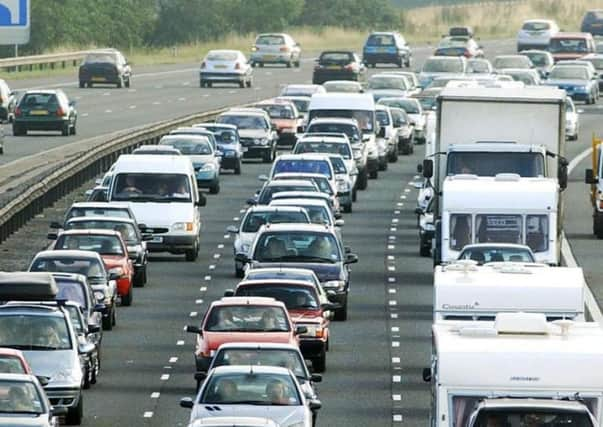Scotland misses climate targets for fourth year


Campaigners and political opponents demanded action as environment minister Aileen McLeod admitted she was “disappointed” the government’s annual targets for greenhouse gas emissions had not been reached. Dr McLeod made a statement to MSPs yesterday after a report showed emissions fell by 3.6 per cent between 2012 and 2013, to 53 million tonnes of carbon dioxide. When that total is adjusted to take into account the EU emissions trading system, the figure falls to 49.725 MtCO2e (million tonnes of carbon dioxide equivalent) – above the target set by Scotland’s climate change laws of 47.976 MtCO2e for the year.
The most recent reductions contribute to an overall 38.4 per cent drop in adjusted emissions since 1990. But cuts of at least 42 per cent by 2020 and 80 per cent by 2050 are required by the 2009 Climate Change (Scotland) Act.
Advertisement
Hide AdAdvertisement
Hide AdThe targets are among the world’s toughest and were designed to help limit a global temperature rise to no more than 2C above pre-industrial levels.
Dr McLeod said that Scotland “like all other countries … must continue to lift the pace of our actions” but also tried to put a positive gloss on the figures, saying: “Scotland is well on track to meet our ambitious emissions targets, with these latest figures for 2013 showing we are more than three-quarters of the way there with seven years still to go.
“Our emissions have fallen by 38.4 per cent from the 1990 baseline, outperforming the original 31.7 per cent reduction that was required to meet the 2013 annual fixed target.
“Today’s figures show if it had not been for successive increases to the baseline since the targets were established, Scotland would have met, and exceeded, our target for this year and the three previous years, too.”
Dr McLeod insisted ministers had put together a “comprehensive package of policies and measures”, announcing a new energy efficiency programme for all properties in Scotland, both residential and commercial. This “has the potential to transform the energy efficiency of Scotland’s housing stock” she said. “It will provide an offer of support for all buildings in Scotland to help them achieve a good energy efficiency rating over a 15- to 20-year period.”
The Scottish Government has already increased its investment in domestic energy efficiency from £94 million last year to £119m this year, and since 2009 has committed more than £500m to tackling fuel poverty and energy efficiency, she said.
The government will also establish a second future transport fund to help reduce emissions from this sector and encourage people to be more active. With the school run a “significant cause” of congestion and local air pollution, Dr McLeod said ministers would “investigate school transport choices”.
Meanwhile, an additional £5m will be made available over the next two years to help councils roll out food waste collections to homes across Scotland.
Advertisement
Hide AdAdvertisement
Hide AdHowever, opponents accused the government of a “lack of ambition”, arguing that tougher new policies are needed.
Patrick Harvie MSP, the co-convener of the Scottish Greens, said: “The Scottish Government has had since 2009 to put in place policies to live up to our much-heralded climate change targets, and they have failed spectacularly.
“Since the act was passed we have put nearly ten million tonnes more greenhouse gases into the atmosphere than the targets allow – demonstrating a staggering lack of ambition by this government.
“Scotland has a clear opportunity to be a greener and fairer country, and there is a wide range of voices growing hoarse calling for a speedier transition to the low-carbon economy we know we can enjoy.”
Scottish Labour’s shadow minister for the environment Sarah Boyack said: “The missed target is embarrassing for SNP ministers but they should be wary of watering down ambition to save face.”
She said improvements are necessary in transport, agriculture, housing and the public sector. “What we need is decisive action to continue to close the gap,” she added.
Tom Ballantine, chairman of campaign group Stop Climate Chaos Scotland, said the new measures showed ministers had “yet again failed to commit to the transformative policies needed to build a better, low-carbon Scotland”. He added: “Climate emissions from transport continue to languish at 1990 levels, and it seems like the Scottish Government’s transport policies are stuck in the last century too.”